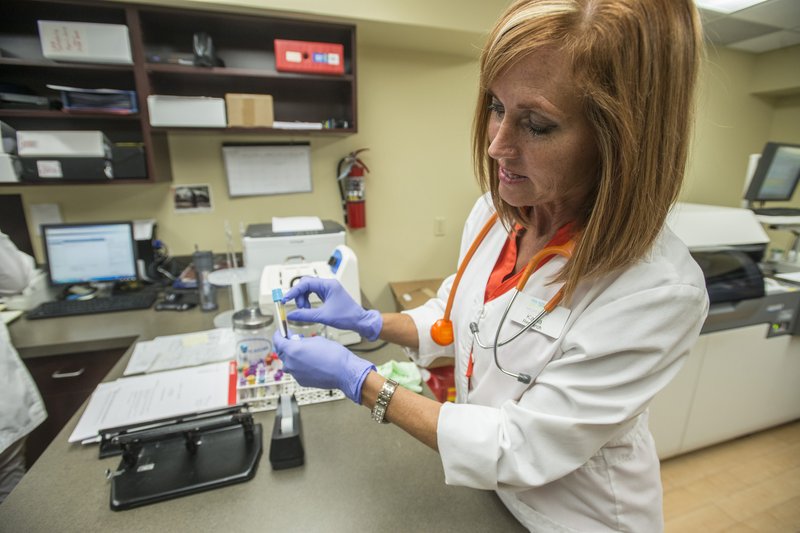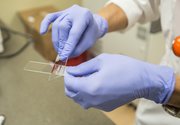FAYETTEVILLE -- Kari Nikolish credits her participation in a research study with helping her beat an aggressive form of breast cancer 10 years ago.
The study was for Herceptin, approved in 1998 by the U.S. Food and Drug Administration for a limited number of breast cancer patients. The federal agency expanded who could use the drug in 2006.
By the numbers
193,404 Total registered clinical studies
17,694 Studies with posted results
99,040 Drug studies
42,628 Behavioral studies
16,914 Surgical procedures
86,019 U.S. studies
3,530 Arkansas studies
Source: National Institutes of Health
Nikolish was surprised she could participate in the study at Highlands Oncology Group. She said the only way for her to get the drug at the time was to enroll in the study.
"I know that I am a very great example of science working its best," she said. "It's just amazing what it did for me, and it's so important to have access to research available locally."
Local health care organizations have played a larger role in research in the past 25 years. Nearly 70 percent of research in 1991 was done at academic health centers, according to CenterWatch, a Boston-based online clearinghouse for research information. Academic centers now account for about one-third of trials with more studies spreading to medical offices to involve a more diverse population.
Research provided locally is good for physicians because it gives them training and access to drugs sooner, said Dr. J. Thaddeus Beck of Highlands.
Dr. Joseph Ivy of Ivy Women's Cancer Care in Rogers said patients benefit because they don't have to travel, which saves them money and lets them remain close to family and friends.
Beck often serves as principal investigator in the research. Ivy partnered with Highlands in 2013 and the surgeon also plays a role in the cancer studies.
Breast cancer is just one area patients at Highlands are helping research, Beck said. Highlands has clinics in Fayetteville and Rogers. Patients are participating in 44 studies, including 15 lung cancer, six breast cancer and four melanoma projects. About 80 patients are participating in research, and the clinic's research staff is following about 100 more, said Courtney Simmons, Highlands director of clinical research. Highlands treated 9,289 patients in 2014.
Beck and Ivy recently collaborated on ovarian cancer research, which was presented last month at the annual meeting of the American Society of Clinical Oncology.
"I think it's an exciting time in cancer research," Ivy said. "This is the most amount of data we've had coming at us at one time."
Washington Regional Medical Center in Fayetteville and Mercy Northwest Arkansas in Rogers are both participating in clinical research, but have no cancer studies in the works. Northwest Health, with hospitals in Springdale, Bentonville and Johnson, does not participate in clinical research.
National research
The National Institutes of Health reports 193,404 active clinical trails worldwide with 3,530 under way in Arkansas on its clinicaltrials.gov website. More than half of studies involve drug tests.
Sarah Peddicord, Food and Drug Administration spokeswoman, said the agency regulates clinical trials because it must approve drugs before they can be widely used. Any trial going on in the U.S. has to be registered on clinicaltrials.gov.
Studies are sponsored by the National Institutes of Health, other federal agencies, nonprofit organizations and private industries such as pharmaceutical companies.
The National Institutes of Health invests nearly $30.3 billion annually in medical research. More than 80 percent is awarded through almost 50,000 competitive grants. Grants go to more than 300,000 researchers at more than 2,500 universities, medical schools and other research institutions in every state and around the world.
The National Cancer Institute lists two projects with Highlands: one each for lung cancer and mesothelioma. Peddicord said drug companies pay for most drug trials.
Participants get the drugs free if they are in a study phase because pharmaceutical companies cannot sell drugs if they are not approved by the federal government, Beck said.
The institute reports the number of registered clinical studies has nearly doubled in the past five years from 101,175 to 193,404. The number of studies in 2000 was 5,635.
The number of people, nationally, willing to participate has not kept pace with the increasing number of trials. The Tufts Center for the Study of Drug Development reports enrollment rates dropped 20 percent since 2000 with about 2 million people volunteering.
Also, a poll by the Center for Information & Study on Clinical Research Participation shows more than 60 percent of people are worried about safety issues.
Sometimes people just don't know about the options. Research!America, a nonprofit research education and advocacy organization, reports 72 percent of Americans say they would participate in a clinical trial if it was recommended by their doctor. Sixteen percent said they or someone in their family has ever participated in trials.
Local trials
Beck said finding patients willing to participate in clinical trials locally has not been a problem.
Nikolish said she took part in the study because her prognosis was not good. She said she would not have been able to use the drug that helped her beat cancer if it wasn't for other people who were willing to take part in research before her.
"I believe in giving back," Nikolish said. "Science is making more and more progress all the time."
Highlands has a staff of 15 dedicated to research, including regulatory personnel, data management, lab collectors and participant coordinators.
"We are very fortunate that the doctors here are very research oriented. That helps with enrollment," Simmons said.
She said research opportunities are constant, and Highlands is at a point were it must turn down some projects.
"We want to make sure we are doing quality and not just quantity," Simmons said.
Participants also need to realize research is something that takes time, and it can be several years before a new drug is approved, she said.
The Center for Information & Study on Clinical Research Participation reported drugs averaged 6.9 years of clinical research, and an additional 1.7 years to receive approval.
"There is no instant gratification in research," Simmons said.
Nikolish was 35 years old when she was diagnosed and knew she was making a long-term commitment when she signed up for her trial. She graduated from the treatment stage to annual checkups with Beck. Results are sent beck to the drug company so it can watch for any negative effects.
"Dr. Beck enrolled me in some other trials as well that follow you and look at your prognosis. When you are a younger patient, they can get longer looks at impact," she said. "I lead a wonderfully healthy life now."
Christie Swanson can be reached at cswanson@nwadg.com or on Twitter @NWAChristie.
NW News on 07/06/2015

